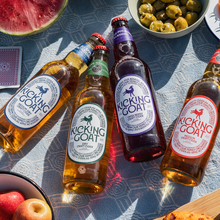Influencer Marketing Takes Centre Stage as UK Brands Prepare for a Major Investment Surge in 2026
- Hinton Magazine

- Nov 25, 2025
- 3 min read

Influencer marketing is no longer a side note in brand strategy. It has become one of the most powerful engines of modern communication, and new research reveals that the United Kingdom is not just participating in this shift but leading it. According to The State of Influencer Marketing in Europe 2025, a benchmark study from Kolsquare created with NewtonX, an extraordinary eighty one percent of UK marketers plan to increase their influencer marketing budgets in 2026.
This renewed confidence places the UK at the forefront of the European creator economy. Eighty four percent of UK brands and agencies expect to work with more creators next year. While almost a third spend under seventy five thousand pounds annually, a significant fourteen percent invest more than one million pounds each year, putting the UK alongside Germany as one of Europe’s most committed spenders.
Part of this momentum comes from technology. One in three UK marketers now use a dedicated influencer marketing platform, the highest adoption rate across Europe, giving British brands a level of sophistication that sets them apart.
The UK also dominates the micro influencer space, with ninety three percent of marketers collaborating with creators who have between ten thousand and one hundred thousand followers. The appetite for small but highly engaged influencers continues to grow, reinforcing the industry’s shift toward authenticity and community led connection.
Quentin Bordage, Founder and CEO at Kolsquare, captures this movement succinctly: “The UK is setting the tempo for Europe’s influencer marketing evolution. British brands are moving fast, scaling partnerships with confidence and embracing technology, creativity, and performance measurement. The UK’s blend of innovation and maturity makes it one of the most exciting influencer markets in the world.”
A Deeper Look at the UK Landscape
The report reveals a marketing culture that is both fast moving and increasingly strategic. Thirty nine percent of UK brands manage influencer marketing in house, supported by agencies. Thirty eight percent use dedicated influencer platforms while forty percent rely on broader marketing technology to run campaigns. Instagram continues to dominate at ninety two percent, followed by TikTok at eighty percent and YouTube at fifty nine percent.
The rise of micro creators has not dampened enthusiasm for nano influencers. Sixty percent of marketers work with creators in the one to ten thousand follower bracket. These partnerships thrive on relatability and trust, elements that modern consumers increasingly expect from the brands they follow.
Influencer selection is becoming more thoughtful too. Fifty five percent of marketers prioritise engagement rates. Sixty three percent focus on the creator’s content style and nearly half consider authenticity as essential, seeking influencers who genuinely know and appreciate the brand. Diversity also matters more in the UK than anywhere else in Europe, with twenty three percent listing it as a key factor in their decision making.
Budgets reflect this new maturity. Thirty two percent of UK marketers currently spend between one hundred thousand and four hundred and ninety nine thousand pounds a year on influencer activity. That figure looks set to grow.
Where the Money Is Going in 2026
The report signals clear priorities for next year. Investment is rising in paid media, long term creator partnerships, and user generated content. At the same time, in person events, affiliate marketing, and ambassador programmes will see reduced budgets as brands concentrate on scalable digital engagement rather than short bursts of activity.
The Bigger Picture for Brands and Agencies
For UK brands, the message is unmistakable. Influencer marketing is no longer optional. It has become essential for staying visible, competitive, and connected to audiences who expect creativity and authenticity from the companies they support.
To succeed, brands will need to embrace creators not only for awareness but for long term impact. Micro and nano influencers are proving that influence is not measured solely by size but by resonance. Agencies and marketers must also refine frameworks for ROI measurement, brand safety, and ethical collaboration, areas that UK teams are already prioritising.
With the UK leading Europe in technology maturity and early adoption of AI, there is a unique opportunity to build influencer programmes that are sharper, more efficient, and more data led than ever before. Platforms like Kolsquare are helping marketers streamline workflows while deepening the quality of their campaigns.
Influencer marketing in the UK is entering a new era. It is faster, more intelligent, and more culturally aware. And as 2026 approaches, British brands appear ready to claim their place as the driving force behind Europe’s creator economy.
.png)
_edited.jpg)












Comments